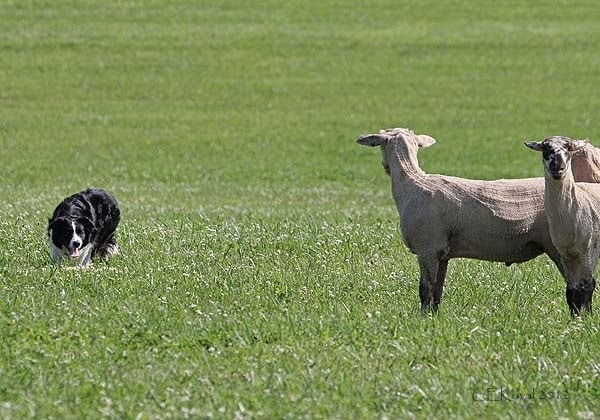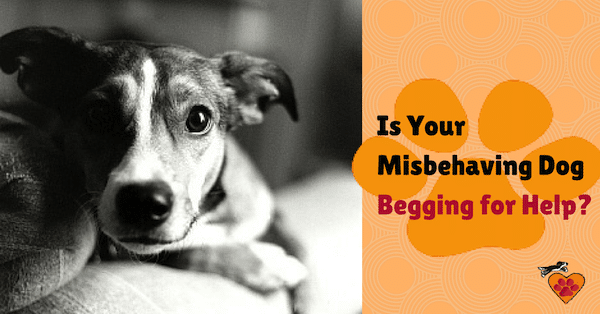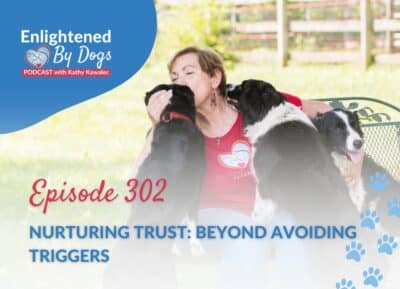Remember the last time your dog ‘got distracted’, ‘blew you off’, or just ‘didn’t listen’?
• Maybe the last time your dog broke her stay?
• How about when he left you to sniff the ground or pee on a post?
• Wasn’t that just last week that she leapt right over the A-frame contact?
• Aren’t you still smarting with embarrassment from that trial where your dog chased sheep down the field?
• How about the time when your enthusiastic greeter slapped muddy paws all over your neighbor’s dress clothes?
These training and performance challenges and others just like them are the source of frustration for so many of us. We think we’re doing a good job training and handling our dogs, and yet we are still experiencing these problems. Maybe just once in a while, or maybe a lot. Looking back at our training and trial preparation, we just don’t find the answer to where it went wrong. So we train harder, train more often. Still the problems crop up.
When we can’t ‘train away’ the problem, we might ultimately conclude that our dog ‘has her own agenda’.
And, I completely agree with you. But not for the reason you think. After 35+ years of training and showing horses and dogs, I’ve discovered that our dogs DO have their own agenda, and here it is: Dogs THRIVE when they are a contributing member of well functioning family. Dogs are social beings, like humans. We have a lot in common, and that’s one of the main reasons we get along so well. Dogs LOVE to please us, in the same way we love to please people (and animals) we care about. Like us, dogs SEEK harmony, companionship, and a way to contribute to the overall well-being of their family group. That’s their agenda.
The reason that you are having these training and performance issues is that your dog does not understand what you want.
Every time your dog ‘makes a mistake’ or ‘blows you off’ or ‘gets distracted’ or ‘doesn’t listen’: It’s FEEDBACK. Plain and simple.
Your dog is communicating to you. She’s saying: “I don’t get it.” Or: “This is really hard.” Maybe he’s saying: “Could you please be more clear?” Or: “I could really use some help with this!”
Here’s a perfect example.

My intention is to teach my students the process for understanding, problem solving and making valid choices…to help them to become great dog trainers...not only to listen to my advice, but to be effective trainers even when I’m not there with them.
So, we discussed the situation. Here is what we concluded: The handler was not closely watching her sheep, nor was she doing her part to contain the sheep in front of her when her dog did bring them to her. The dog wouldn’t lie down where she wanted, because she was asking him at the worst possible time in the worst possible place. That caused her dog to become very tense because he couldn’t do his job properly. The more tense he became, the worse things got.
The solution: The handler needed to take a deep breath and relax. Then, assess the big picture. The set up was too hard for her dog. How could this be made easier, ensuring success? We repositioned the dog, and the handler moved into a more helpful position too. We made sure that we sent the dog to gather the sheep in the direction most likely to be successful. The handler was to contain the sheep without pushing them away with rough movements. And she was to carefully watch the sheep, not asking her dog to lie down until he was at balance. (fyi: balance means the exact place that controls the sheep in the desired position)
The result: Perfection! The dog calmly brought the sheep to his favorite woman. She calmly communicated to the sheep, containing them in front of her. The dog lied himself down at balance, she didn’t even have to ask him. It was a beautiful and perfectly executed gather. They then repeated that in several places around the field, and it was perfect every time.
Summary: This dog was begging for help from his handler. All he had on his agenda was to bring her the sheep like he knows to do. He needed help, not a correction. He needed information, not an accusation.
Is your dog begging for help?
Think of the last time your dog ‘made a mistake’ or ‘blew you off’ or ‘got distracted’ or ‘didn’t listen’. Then follow my Formula for Dog Training Success. This formula applies to any type of dog training, any dog sport, any venue, any level of expertise.
Kathy’s Formula for Dog Training Success1. Assess the big picture — what exactly is the lesson? 2. What feedback is your dog giving you, precisely? 3. How can you set up the lesson easier, ensuring success? 4. What information does your dog need from you, in order to be successful? 5. Get Help. Have your trainer/coach watch, or even a friend. A video camera is perfect! You can review, and so can your coach. |
Then go ahead and try again. Make adjustments as needed…you may need to go through the steps several times until you become fluent in the process.
Click the Banner to Download Your Free Book and get on my VIP Subscriber list for the latest tips and insights:
 Experience Success in all you do … sports, performance and every day life.
Experience Success in all you do … sports, performance and every day life.
This FREE guide will teach you 5 Core Principles that will help you:
- Identify and Solve Your Dog Training Challenges.
- Get the Performance Results You Want.
- Be a Fun, Confident, Attentive Trainer that Your Dog Adores!






